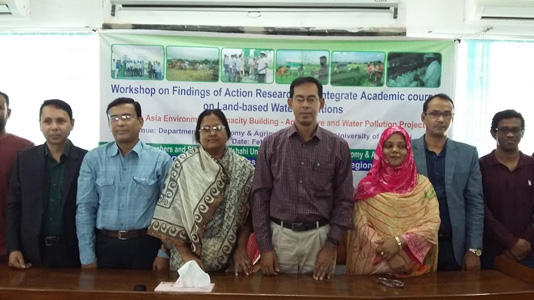RAJSHAHI, Feb 22, 2020 (BSS) – Comprehensive efforts of all the
government and non-government entities, educational and research institutions
concerned has become indispensable to halt the land-based water pollution to
protect the habitable environment from all sorts of hazardous condition.
Academics and researchers made the observation while taking part in
discussions of a workshop titled “Finding of Action Research and Integrate
Academic Course on Land-based Water Pollution” here today.
Rajshahi Regional Office of Caritas Bangladesh in association with its
‘South Asia Environmental Capacity Building – Agriculture and Water Pollution
project’ organized the workshop at Gallery room of the Department of Agronomy
and Agriculture Extension in Rajshahi University (RU).
In the workshop, Prof Mizanoor Rahman from the Department of Geography
and Environmental Studies in RU and National Coordinator (SAFBIN) of Caritas
Rajshahi Region Zillur Rahman presented their respective findings of a two-
year research conducted on land and water pollution in ten villages of
Huzuripara Union in Paba Upazila of the district.
They told the meeting that excessive and indiscriminate uses of toxic
agro-chemicals generate different kinds of risks and trouble in both land and
water.
The issue of land and water pollution is being adjudged as a serious
threat to the public health in the present context of exorbitant use of
chemical fertilizer and pesticides in farms. The problem, however, can be
mitigated to a greater extent through creating public awareness.
Chairman of the department Prof Fahmida Chowdhury and her colleagues
Prof Giush Uddin Ahmed, Prof Shahidul Alam, Prof Mustafizur Rahman and Prof
Rabiul Alam and Caritas Manager Iftekhar Hossain and Research and Advocacy
Officer Abul Bashar Mollah addressed the meeting as panel discussants.
The discussants put forward a set of recommendations on how to end the
land and water pollution collectively.
The experts unanimously viewed substantial and sustainable promotion of
organic fertilizers and pesticides is very crucial for protecting the water
resources and soil health from pollution for the sake of producing safe food.
Using chemical fertilizers and pesticides in farming fields is always
harmful to soil, water, crops, environment and public health as a whole. So,
there is no way but to giving utmost importance towards promoting good
practices in agriculture widely.
Prof Fahmida Chowdhury identically mentioned that the pollution can be
resisted through strict enforcement of the existing laws and regulations as
land-based pollution involves a number of interrelated pressures.
She advocated for an integrated approach combining environment,
pesticides and fertilizer authorities so that they can work together to
mitigate water pollution caused by agriculture.
Besides, establishment of technologically advanced testing institutes
and awareness raising programmes for using pesticides should be taken into
consideration, she added.



